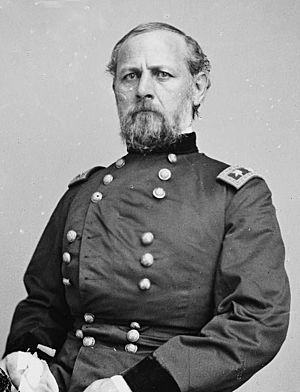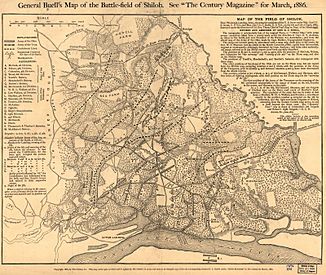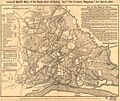Don Carlos Buell facts for kids
Quick facts for kids
Don Carlos Buell
|
|
|---|---|
 |
|
| Born | March 23, 1818 Lowell, Ohio |
| Died | November 19, 1898 (aged 80) Rockport, Kentucky |
| Buried | |
| Allegiance | Union |
| Service/ |
United States Army Union Army |
| Years of service | 1841–1864 |
| Rank | |
| Commands held | Army of the Ohio |
| Battles/wars | Seminole War Mexican–American War
|
| Other work | President of the Green River Iron Company, pension agent |
Don Carlos Buell (born March 23, 1818 – died November 19, 1898) was an important officer in the United States Army. He fought in several wars, including the Seminole Wars, the Mexican–American War, and the American Civil War. During the Civil War, Buell led Union soldiers in major battles like Shiloh and Perryville. People were often unhappy because he was very careful and sometimes slow. He was removed from his command in 1862 and did not play a big role in the war after that.
Contents
Early Life and Military Training
Don Carlos Buell was born in Lowell, Ohio. He was the oldest of nine children. His father died when he was only eight years old. His uncle then took him in and raised him.
Buell's uncle helped him get into West Point, a famous military school. Even though he was smart, he often got into trouble. He graduated in 1841, ranking 32nd in a class of 52 students.
After West Point, Buell became a second lieutenant. He was sent to Florida to fight in the Seminole Wars. However, he did not see any actual fighting there.
Fighting in the Mexican-American War
Buell later served in the Mexican–American War. He fought under important generals like Zachary Taylor and Winfield Scott. He was honored three times for his bravery. He was also wounded during the Battle of Churubusco.
Between the wars, Buell worked in the U.S. Army's main office. He became a captain in 1851. By the time the Civil War began, he was a lieutenant colonel.
Civil War Service
When the American Civil War started, Buell wanted an important leadership role. His friend George B. McClellan became a key leader for the Union. Buell was first sent to California.
After a Union defeat, McClellan called him back east. Buell was quickly promoted to brigadier general. He helped organize the Army of the Potomac.
Leading the Army of the Ohio
In November 1861, Buell was put in charge of the new Army of the Ohio. This army was based in Louisville, Kentucky. At first, it was not very well-organized. Buell worked hard to train the new soldiers.
President Abraham Lincoln wanted Buell to take control of Eastern Tennessee. This area had many people who supported the Union. But Buell moved slowly. He said the roads and railroads were not good enough. He worried about his army's supplies.
Instead, Buell suggested working with another general, Henry Halleck. Their plan was to cut off Nashville. This plan worked, and Nashville fell to Buell's army in February 1862. However, Halleck and Buell's relationship became difficult.
The Battle of Shiloh

In April 1862, Buell was ordered to help General Ulysses S. Grant's army. Grant's troops were at Pittsburgh Landing, near the Tennessee River. On April 6, Confederate soldiers launched a surprise attack on Grant's army. This started one of the biggest and bloodiest battles of the war.
Buell's army arrived the next day. The combined Union forces pushed back the Confederates. Buell believed he was the main reason the Union won at Shiloh. He felt Grant had not done much to help. However, many historians today believe Grant's actions on the first day were crucial. They also note that Buell was slow to commit his troops on the second day.
After Shiloh, Buell's army moved slowly towards Corinth, Mississippi. This was a Confederate stronghold. Buell took many breaks to fix railroad lines. He did not want his soldiers to take food from local farms. He even punished an officer for letting his soldiers loot homes. This made his troops and the War Department unhappy. President Lincoln later overturned the punishment.
The Siege of Corinth ended when the Confederates left the city in May. Buell was then sent east to capture Chattanooga. His advance was very slow. When Confederate cavalry attacked his supply lines, Buell stopped his effort to take Chattanooga.
Campaign in Kentucky
In September, Confederate armies invaded Kentucky. Buell had to act. He marched his army to Louisville. His soldiers were happy to finally be moving. They were excited to enter a state that had not seen much fighting.
Buell's army reached Louisville on September 25. He learned that the Confederate army was nearby. But Buell thought he was outnumbered and did not chase them.
On October 8, 1862, part of Buell's army was attacked at the Battle of Perryville. Buell was a few miles away and did not know a big battle was happening until late in the day. Because of this, he did not use all of his army's strength. His officers urged him to attack the next day. But he refused, saying he did not know how many Confederates he was facing. The Confederates retreated the next morning.
Even though the Union held the battlefield, the Confederates escaped. Buell had not used most of his army, even though he had many more soldiers than the Confederates. Some of his own officers and soldiers began to doubt him.
President Lincoln wanted Buell to chase the Confederates right away. But Buell said the direct route was too difficult. He wanted to go back to Nashville first. On October 24, Buell was removed from command of the Army of the Ohio. He was replaced by Major General William Rosecrans.
A military committee looked into Buell's actions. They did not reach any strong conclusions. Buell felt his reputation was cleared. He was ordered to wait for new assignments, but none came. In 1864, Grant offered him a position. But Buell refused to serve under generals he felt he outranked. He resigned from the army on June 1, 1864.
Later Life and Legacy
After the war, Buell lived in Indiana and then Kentucky. He worked in the iron and coal industry. He continued to face criticism for his actions during the war. He wrote newspaper articles defending himself. He always believed he was the hero of the Battle of Shiloh.
Buell died on November 19, 1898. He was buried in Bellefontaine Cemetery in St. Louis.
Buell was sometimes called "The McClellan of the West." This was because he was very cautious. He wanted a war that would not harm civilians or interfere with slavery. Even though he was against states leaving the Union, he often disagreed with President Lincoln's government.
Many fellow generals still respected Buell. They felt he was treated unfairly. For example, William Tecumseh Sherman wrote that removing Buell did not make the army better. Buell's strict discipline and difficulty connecting with his soldiers may have also caused problems for him.
Buell Armory at the University of Kentucky is named after him. Buell Island in his hometown of Lowell is also named in his honor. His personal papers and belongings are kept at the University of Notre Dame.
Images for kids
[[Category:American slave owner
]]
See also
 In Spanish: Don Carlos Buell para niños
In Spanish: Don Carlos Buell para niños
 | Shirley Ann Jackson |
 | Garett Morgan |
 | J. Ernest Wilkins Jr. |
 | Elijah McCoy |



